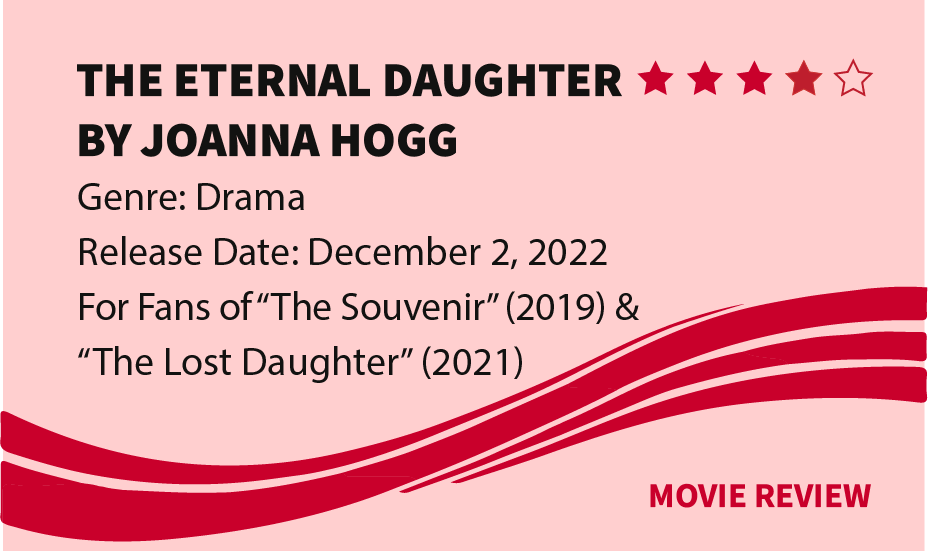“The Eternal Daughter:” A tale of spectral sorrow

The opening shot of Joanna Hogg’s excellent new film “The Eternal Daughter” depicts a porcelain-skinned Julie, played by Tilda Swinton, staring longingly out the window of a quaint taxicab, her gaze drilled into the darkness of a never-ending forest overlain with thick clouds of fog. Her reflection emerges from the depths of this darkness before the camera cuts to a much older Rosalind (also played by Swinton) sitting right across from her younger counterpart.
Rosalind lasers her focus on Julie’s furrowed brow, paying close attention to the worry stored in the wrinkles of her face that appear on her own as well. It is here that revisions of a tale as old as time begin to play out; this film shows its concern with interrogating mother-daughter relationships at every turn, though it is abundantly clear that Julie and Rosalind are fragmented mirror images of one another, through form and performance.
“The Eternal Daughter,” written and directed by Hogg in her third feature for A24 and co-produced by the one and only Martin Scorsese, is in many ways a spiritual successor to her “The Souvenir” films. However, it firmly establishes its own place in her filmography, mostly as a hauntingly melancholic ode to her relationship with her 94-year-old mother. The film centers on Julie, the daughter of Rosalind, taking her mother to her former family home, which has been converted into a hotel. During her stay, Julie attempts to write her next film whilst confronting ghastly spirits and occurrences around the hotel. At the heart of the film is an inquisition into what it means to Hogg to be a filmmaker and what that requires she takes from those around her and those she loves.
Shot in secret in Wales during the pandemic, Hogg had to assemble an incredibly tiny cast and crew. From these circumstances, one of the film’s greatest assets was born: Swinton’s dual performances as both mother and daughter. Swinton, who has firmly established herself as one of Hollywood’s most deeply idiosyncratic heavyweights, has never been one to shy away from a challenge. This is not the first time Swinton has assumed disparate roles in the same film; Luca Guadagnino’s “Suspiria” (2018) marked that occasion. Swinton is the soul of “The Eternal Daughter”; it is a treat to observe her masterfully inhabit two completely different characters constantly in conversation with one another, reckoning with various feelings of inadequacy relative to each other.
Hogg interpolates tried and true supernatural horror tropes to create an unmistakably eerie yet oddly intimate and comforting film. For a film that explicitly deals in paranormal phenomena, it is a testament to Hogg’s cinematic expertise that there is a cozy levity for viewers to settle into here. Part of this is accomplished through Hogg’s wonderful sense of humor, largely written into the character of a laughably curt hotel receptionist, played excellently by newcomer Carly-Sophia Davies. The hotel itself also functions as an almost living, breathing entity interacting with the few characters that occupy it; Hogg shoots it with a keen attention to detail and spatial awareness that enhances the unease the film conjures in viewers, especially in its first half.
Every step Julie takes as she attempts to locate the source of unknown noises echoes throughout the cavernous building, inspiring creaks, squeaks and clangs that sonically contribute to a seemingly profound emptiness. Earnest portraits of English aristocrats dutifully watch over the corridors of the hotel, their eyes piercingly gazed upon the only guest that dares to roam its halls.
Low-angle shots of the hotel’s central mahogany staircase bestow upon it an imposing nature and provide the hotel with an unmistakable spirit, along with the fog that hangs in the air outside like an ethereal cloak. Hogg uses her robust cinematic lexicon to express the film’s plentiful themes surrounding familial relations and creative production, always maintaining a masterful balance between the ominous, humorous and somber.
Much of the film’s premise, aloof cinematography and lavishly haunted production design pay homage to Stanley Kubrick’s all-time classic “The Shining” (1980). Where that film continually veers into terrifying territory, however, this one forges a path that paints an increasingly desperate picture of an artist in a state of personal crisis. “The Eternal Daughter” affords Swinton plenty of space to flex her acting muscles and Hogg to playfully experiment with the conventions of your typical ghost story, and it doubles as a welcome addition to A24’s recent parent-child relationship drama canon.

